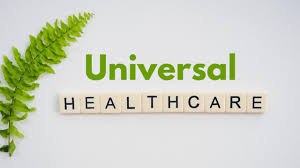
The phrase “a healthy nation is a wealthy one” remains a cliché for most countries that are still suffering or displaying poor health results especially amongst the developing countries. This is because disease is not the only thing they have to contend with. There is the issue of housing, access to clean water, battling with high levels of unemployment and insecurity amongst many others which are competing for the limited financial resources available. And all these issues have a direct or indirect impact on the health of a person and of a population.
The question begs, when timelines are set as to when a nation should attain Universal Health Coverage, are all the connected issues taken into consideration? for example, how can one be healthy while they are living in the streets, or in poorly ventilated houses in over congested regions with no proper drainage or under poor sanitary conditions or when there is no access to clean water and evidence of poor food handling and lack of proper nutrition?
According to Jayesh Saini, attaining UHC should not be viewed just as an issue of having access to health services whenever needed without causing financial hazard. He believes that part of the drive for UHC should be to ensure that preventable diseases do not happen in the first place. Indeed, prevention is one of the key components of UHC for quality health services alongside health promotion, treatment, rehabilitation and palliative care across the life course.
Unfortunately, many countries are only considering how to avail the treatment required when diseases have already struck instead of ensuring minimum occurrence of preventable diseases. The governments, in partnership with the private sector, should come up with programs of health promotion – discussing candidly on issues such as avoidance of lifestyles that cause diseases, to ensuring the basic rights of access to clean water, good housing and clean energy and information are availed to all irrespective of status – social, economic, education, political or religious. When communities have such accesses, waterborne diseases are curtailed to almost 100%, diseases caused by dirty energy are annihilated and lifestyle diseases are reduced due to correct information being available for the masses to counter the adverse foods and drinks that are in the media.
Jayesh Saini says that from experience in healthcare, recurrent diseases that are preventable is very costly and strenuous on the health system. Resources that should be used for non-preventable cases like accidents and pandemics are used for treatment for diarrhea breakout caused by unsafe drinking water or due to drinking of illicit brews.
It is my opinion that with political good will, the governments should form partnerships with private entities to come up with affordable apolitical housing projects that would ensure every individual has some form of acceptable housing with access to clean water and clean energy. With the employed, whether formally or informally getting opportunities to purchase houses at affordable rates, the indigents would have houses constructed using a fund availed and the slums upgrade would be done and those to be given the houses identified and encouraged to contribute even if it is a minimal amount per day, week or month so as to also encourage a culture of saving.
With the issue of housing, safe water and clean energy addressed, concurrently people should get informed, through forums including barazas, on how to stay health, good health eating habits and generally how to keep healthy.
In the issue of rehabilitation, the government should have more facilities that well equipped for various rehabilitation – from alcohol and substance abuse to terminal disease care. Currently, most of the hospices and rehabilitation centers are beyond the reach of many people due to prohibitive prices
This conversation should be heard more so that attainment of UHC is a real game changer for the lives of the people!



















